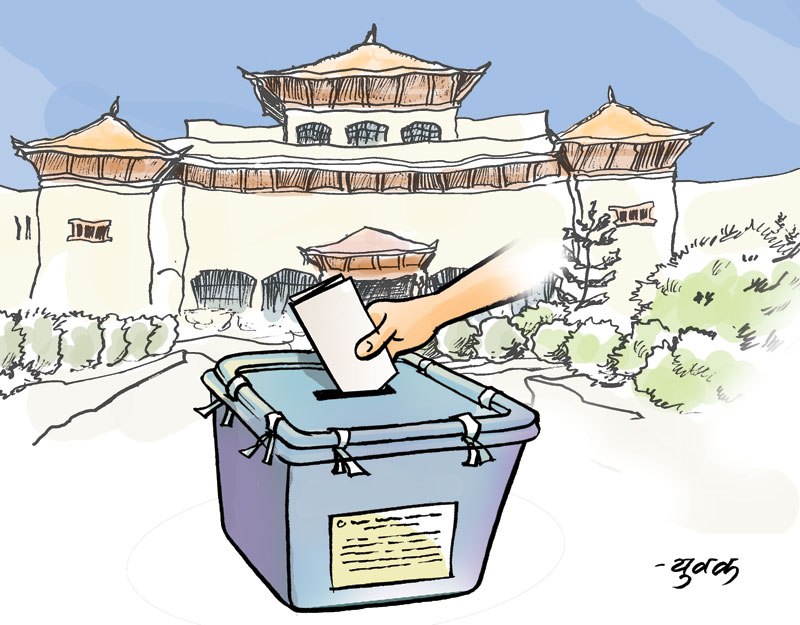
OR
3 pc threshold proposed for parliamentary polls
Published On: July 11, 2017 05:30 AM NPT By: Ashok Dahal | @ashokpillar

-Election bill includes right to reject provision
-1.5 percent threshold for provincial assemblies
KATHMANDU, July 11: The government has proposed a three percent threshold for political parties to get elected to the central parliament in the upcoming parliamentary elections.
A bill on Election of Members of the House of Representatives that includes the threshold provision is all set to be registered in parliament on Tuesday. Though officials of the Home Ministry submitted the bill at the parliament secretariat on Monday, it will be formally registered only on Tuesday.
If parliament endorses the bill in its original form, any political party failing to secure at least three percent of the vote under the Proportional Representation (PR) category will be barred from represention in parliament as a party. If a political party secures less than three percent of the vote under the PR category, directly-elected candidates of that party can be sent to parliament as independent lawmakers.
According to sources, the Home Ministry has submitted the bill to the parliament secretariat for registering on Tuesday. Instead of directly mentioning the threshold criteria, Section 10 of the bill states that "candidates from any political party failing to meet the criteria to become a national party as stated by federal law will be ineligible to be represented in parliament as a party".
The Act Related to Political Parties, passed by parliament four months ago, has provisioned a minimum of three percent of the total valid vote cast under the Proportional Representation (PR) category and at least one seat under First-Past-The-Post for a party to become a national party. Any political party failing to meet the threshold criteria should send their representatives to parliament as independent lawmakers.
Likewise, Section 11 of the bill further explains that votes received by such political parties will not be counted even if these are enough for electing a lawmaker to parliament under the PR category.
In the second Constituent Assembly elections held in 2013, only six political parties -- Nepali Congress, CPN-UML, CPN (Maoist Center), Rastriya Prajatantra Party Nepal (RPPN), Madhesi People's Rights Forum-Democratic and RPP-- had secured more than three percent of the vote under the PR category. During that election, a total of 110 parties were registered at the Election Commission and 30 of them succeeded in securing representation in parliament by at least one lawmaker.
This time around, the Home Ministry has proposed a three percent threshold provision to be effective from the upcoming parliamentary elections that should be held by January 2018 under the new constitution.
Article 84 of the Constitution of Nepal has provisioned that 165 MPs will be elected to the federal parliament under the FPTP category and another 110 under PR.
Fringe political parties have been protesting against any threshold provision in parliamentary elections. But the major political parties are now for including a threshold provision, purportedly for the sake of government stability.
Nepal has seen 10 prime ministers in 11 years since the establishment of the federal republic system.
In 2013, the Election Commission had suggested a 1.5 percent threshold provision for the second Constituent Assembly (CA) elections. The provision was, however, removed following protests by the fringe political parties.
Another bill, related to the election of members of provincial assemblies, has included a provision for a 1.5 percent threshold at the provincial level. At the provincial assembly, 60 percent of the members are elected under FPTP while the remaining 40 percent are elected under PR.
Also, the bill has introduced a None of the Above (NOTA ) provision, following a Supreme Court order to ensure a right to reject provision for the upcoming elections. Section 76 of the bill has provisioned that voters can exercise a right to reject provision by stamping the none of the above (NOTA) option in the ballot paper.
The draft bill has likewise proposed barring anyone from contesting from more than one constituency. According to the bill, at least 50 percent women candidates must be maintained under the PR category and one-third of a party's candidates for First Past the Post (FPTP) should also be women.
Similarly, the bill has provisioned ensuring at least 33 percent women representation in parliament from each political party.
You May Like This

1.5 pc threshold proposed for upcoming parliamentary poll
KATHMANDU, Feb 20: With a view to fostering political stability through a reduction in the number of political parties, the Election... Read More...

Both parliamentary, provincial polls on Nov 26
KATMANDU, Aug 21: After a series of consultations among the political parties and with the Election Commission (EC), the government has... Read More...

Parliamentary hearing on four proposed ambassadors begins
KATHMANDU, March 20: The Parliamentary Hearing Special Committee (PHSC) on Monday began hearing on the four ambassadors the government nominated. Read More...




Just In
- Health ministry to conduct ‘search and vaccinate’ campaign on May 13
- Indian customs releases trucks carrying Nepali tea, halted across Kakarbhitta
- Silent period for by-election to begin from midnight
- SC issues short-term interim order to govt and TU not to take immediate action against TU legal advisor Khanal
- National consultation workshop advocates to scale up nutrition smart community in Nepal
- Patan High Court issues short-term interim order to halt selection process of NTB’s CEO
- NEPSE inches up 0.15 points; daily turnover increases to Rs 2.53 billion
- Bagmati Govt mandates tri-lingual signboards in offices














Leave A Comment